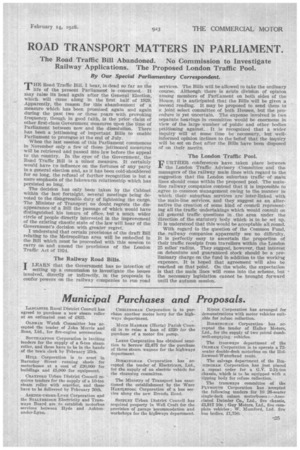ROAD TRANSPORT MATTERS IN PARLIAMENT.
Page 47

If you've noticed an error in this article please click here to report it so we can fix it.
The Road Traffic Bill Abandoned. No Commission to Investigate Railway Applications. The Proposed London Traffic Pool.
By Our Special Parliamentary Correspondent.
rT1HE Road Traffic Bill, I hear, is dead so far as the
life of the present Parliament is concerned. It may raise its head again after the General Election, which will come along in the first half of 1929. Apparently, the reason for this abandonment of a measure which has been promised again and again during the past two or three years with provoking frequency, though in good faith, is the prior claim of other first-class Government measures upon the time of Parliament between now and the dissolution. There has been a jettisoning of important Bills to enable Parliament to prorogue at the end of July.
When the last session of this Parliament commences in November only a few of those jettisoned measures will be retrieved and passed into law before the appeal to the country. In the eyes of the Government, the Road Traffic Bill is a minor measure. It certainly would have no influence on the fortunes of any party in a general election and, as it has been cold-shouldered for so long, the refusal of further recognition is but a mere emphasis of the lukewarm relationship which has persisted so long.
The decision has only been taken by the Cabinet within the last fortnight, several meetings being devoted to the disagreeable duty of lightening the cargo. The Minister of Transport no doubt regrets the disappearance of a Bill the passage of which would have distinguished his tenure of office, but a much wider circle of people directly interested in the improvement of the existing chaotic state of the law will hear of the Government's decision with greater regret. I understand that certain provisions of the draft Bill relating to the Metropolitan area will be embodied in the Bill which must he proceeded with this session to carry on and amend the provisions of the London Traffic Act of 1924.
The Railway Road Bills.
T LEARN that the Government has no intention of -C setting up a commission to investigate the issues involved, directly or indirectly, in the proposals to confer powers on the railway companies to run road
services. The Bills will be allowed to take the ordinary course. Although there is acute division of opinion among members of ParLament on both sides of the House, it is anticipated that the Bills will be given a second reading. It may be proposed to send them to a joint select committee of both Houses, but the procedure is yet uncertain. The expense involved in two separate hearings in committee would be enormous in view of the large number of public and other bodies petitioning against. It is recognized that a wider inquiry will at some time be necessary, but wellinformed opinion inclines to the belief that the inquiry will be set on foot after the Bills have been disposed of on their merits.
The London Traffic Pool.
URTFIER conferences have taken place between the London Traffic Advisory Committee and the managers of the railway main lines with regard to the suggestion that the London suburban traffic of main lines should come within the proposed pool. The mainline railway companies contend that it is impossible to .agree to common management owing to the manner in which their suburban services are' inter-linked with the main-line services, and they suggest as an alternative the creation of some kind of council representing all the traffic undertakings which would consult on all general traffic questions in the area under the direction of the statutory body which is to be set up. It is understood that this would be acceptable all round.
With regard to the question of the Common Fund, the railway companies apparently see no difficulty. It is perfectly easy to ascertain the proportion of their traffic receipts from travellers within the London 25 miles' radius. They suggest, however, that interest on debenture and guaranteed stock should be a preliminary charge on the fund in addition to the working expenses. It is hoped that agreement will also be reached on that point. On the whole, the expectation is that the main lines will come into the scheme, but • the necessary legislation cannot be brought forward until the autumn session.












































































































